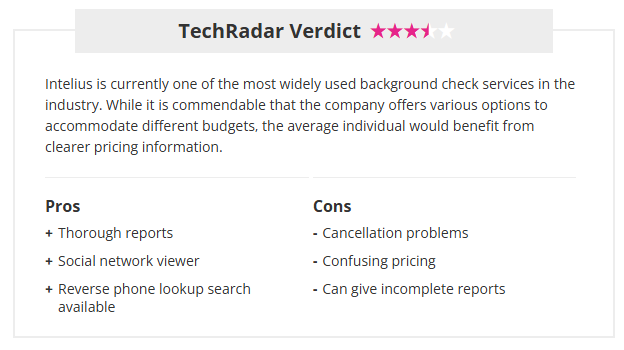Is Intelius a Scam?
Laura Martisiute
Reading time: 8 minutes

Table of Contents
If you’re thinking of using Intelius, you need to know: Is Intelius a scam?
Below, we explain whether Intelius is a scam and discuss some steps you can take to improve your safety when using this platform.
What Is Intelius?
Intelius is a people search site.

You can use it to find out personal information about people, including:
- Full name.
- Aliases.
- Age.
- Phone numbers.
- Email addresses.
- Addresses (current and past).
- Employment history.
- Education history.
- Possible relatives, associates, and relationships.
- Possible images.
- Possible criminal and traffic records.
- Social and business profiles.
- Business profiles.
- Finances (e.g., bankruptcies)
Intelius obtains this data from various sources, including public records and social media profiles, and combines it into comprehensive reports about individuals. It then sells these reports to anyone who pays for them through the Intelius site.
You can search for people’s information on Intelius via their name, phone number, or address.
Potential use cases for Intelius include finding old friends you want to reconnect with, identifying the owner of an unknown phone number, and researching a potential date.
Intelius has an opt-out option for individuals who wish to remove their personal information from the platform (you can see our step-by-step Intelius opt-out guide here).
Is Intelius a Scam?
No, Intelius is not a scam. It’s a legitimate people search site.
However, third-party reviews on Intelius are mixed.
For example, TechRadar gives Intelius 3.5 out of 5.0 stars.
Among the cons listed are confusing pricing and incomplete reports.
To see someone’s personal information on Intelius, you first need to provide your credit card or PayPal information and purchase their report. It’s not possible to pay to look someone up just once. You need to buy a monthly membership.
There are also cancellation problems. TechRadar notes that if you buy one of Intelius’ smaller packages (e.g., an address lookup) that are priced below $1, you are automatically upgraded to full membership once the trial ends.
According to TechRadar, though Intelius does warn you about this before you make a purchase, the price is mentioned in tiny print.
This means you could end up being charged after the trial ends without realizing it.

In 2010, Intelius agreed to pay a $1.3 million settlement with the Washington attorney general for allegedly tricking consumers into enrolling them in membership programs. Though it agreed to the settlement, the company did not agree it had done anything wrong.
An older review on Intelius from Comparitech gives the service a rating of 3.0 out of 5.0 stars (“Mediocre”).
Overall user reviews about Intelius are negative:
- 2.9 out of 5.0 stars (from 406 reviews) on Trustpilot.
- 3.5 out of 5.0 stars (from 589 reviews) on Consumer Affairs.
- 2.1 out of 5.0 stars (from 106 reviews) on Sitejabber.
On internet forums like Reddit, people primarily report negative experiences with the site, particularly regarding the accuracy of the information Intelius provides.
One person said: “I have used it [Intelius] before with about 60% accuracy.”

However, another person said: “It’s [Intelius] decent for getting general info on someone.”
Intelius is a Better Business Bureau-accredited company and holds an “A” rating.
Security
Intelius uses “reasonable security measures” to protect your information from loss, misuse, and alteration.

However, it does not specify what these measures are.
Your data is stored and processed in the U.S., as per Intelius’ privacy policy.
According to Intelius’ Help Center, using its website is safe and will not result in the transmission of viruses. It also says it uses 256-bit encryption to protect your data (email address and password) and payment information.

Privacy
In its privacy policy, Intelius explains the type of data it collects, why it collects it, and with whom it shares it.
Intelius collects the following information:
- User information, e.g., name, email address, mailing address, credit card number, age, and zip code.
- Traffic data, e.g., IP address, access times, browser type and language, ISP, pages you visit, content you view on the Intelius site, etc.
- Third-party data, e.g., information from social media, credit reporting agencies, etc.
- Inferred data, for example, based on your browsing/purchases, Intelius may infer your interest in certain brands/products.
It uses this information for various purposes, including operating and improving its site and services, communicating with you, personalizing experiences, delivering targeted ads, detecting fraud, complying with laws, enhancing AI technologies, and marketing to you.
Intelius may share your information with service providers, affiliates, advertising partners, law enforcement or legal entities, and during corporate changes (e.g., mergers).
It may use aggregated/anonymized data for any purpose.
Intelius says it will retain your information as long as necessary for business or legal reasons. Retention criteria include legal requirements, business needs, and data sensitivity. The company does not provide specific retention timelines.
You can update your account information or deactivate your account at any point by logging into your Intelius account.
Even if you delete your account, Intelius may keep cached or archived copies of your information for business or legal purposes.

Intelius does not include the personal information it collects about its users in its public data reports.

Opting out of Intelius
Just like you can use Intelius to search for someone else’s personal information, someone else can do the same to you.
Your personal information is likely available on Intelius.
If you don’t want others to be able to find your personal data, you should opt out of Intelius.
The personal information on people search sites like Intelius can be used for legitimate purposes (e.g., finding old friends), but it can also be used for malicious reasons, too.
For example, harassment, identity theft, doxxing, stalking, and social engineering attacks (in fact, we know from leaked criminal chat logs that attackers use people search sites).
You can read more about data brokers and people search sites in our data broker guide.
Having inaccurate information on people search sites can be just as harmful as having real data.
In 2011, a man sued the people search site Spokeo, claiming that the erroneous information the site had on him might have resulted in him missing out on job opportunities.
In another example, a man had his mugshot posted on a people search site that publishes arrest information, even though he was never charged with a crime. Unsurprisingly, he found it challenging to find a job.
To opt out of Intelius, follow our Intelius opt-out guide. Or, subscribe to DeleteMe to have privacy professionals remove you from Intelius and other people search sites on your behalf – and do so continuously.
Continuous removals are critical because most people search sites republish your data when they find more of it, even if you previously opted out.
So, Should You Use Intelius?
Depends.
It can be a good option for finding generic information about individuals but don’t rely on the data to be accurate or up-to-date.
Also, remember that just like you can use Intelius to find out someone’s personal details, others can do the exact same to you. We strongly recommend you opt out of Intelius and other people search sites or subscribe to a service that can do that on your behalf.
How to Use Intelius Safely and Privately
- Verify data. Don’t use Intelius for important decisions, as the personal details provided may not be accurate or up-to-date.
- Use a masked email. When signing up for Intelius, use a masked or disposable email (or create a new one just for this purpose) rather than your primary email. Doing so will protect your email inbox from spam and reduce the likelihood of your identity being compromised in the event of a security incident, such as a data breach.
- Don’t use Intelius for employment or tenant screening. Intelius is not FCRA-compliant. You can’t legally use it for hiring, tenant screening, or credit check purposes.
- Opt out of Intelius. If you don’t want your information to be available on Intelius for anyone to see, opt out. See our Intelius opt-out guide for step-by-step instructions, or subscribe to a data broker removal service like DeleteMe to have our privacy experts remove you from Intelius and other people search sites on your behalf.
- Recheck Intelius periodically. Even when you opt out of people search sites, they commonly republish your data once they find more of it. As a result, opt-outs need to be continuous. Data broker removal sites, such as DeleteMe, periodically recheck people search sites to ensure your data hasn’t reappeared. If you decide to opt out manually, make sure to set a reminder to check these sites yourself.
- Opt out of other people search sites. Intelius is just one of many people search sites that publish your information. See our opt-out guides section for more information.
- Be on the alert for phishing scams. Scammers can use people search sites to target individuals in attacks, including phishing emails and texts. If you get any unexpected emails, texts, or calls, don’t share sensitive information or click on any unusual links.
Our privacy advisors:
- Continuously find and remove your sensitive data online
- Stop companies from selling your data – all year long
- Have removed 35M+ records
of personal data from the web
Save 10% on any individual and
family privacy plan
with code: BLOG10
news?
Don’t have the time?
DeleteMe is our premium privacy service that removes you from more than 750 data brokers like Whitepages, Spokeo, BeenVerified, plus many more.
Save 10% on DeleteMe when you use the code BLOG10.
















